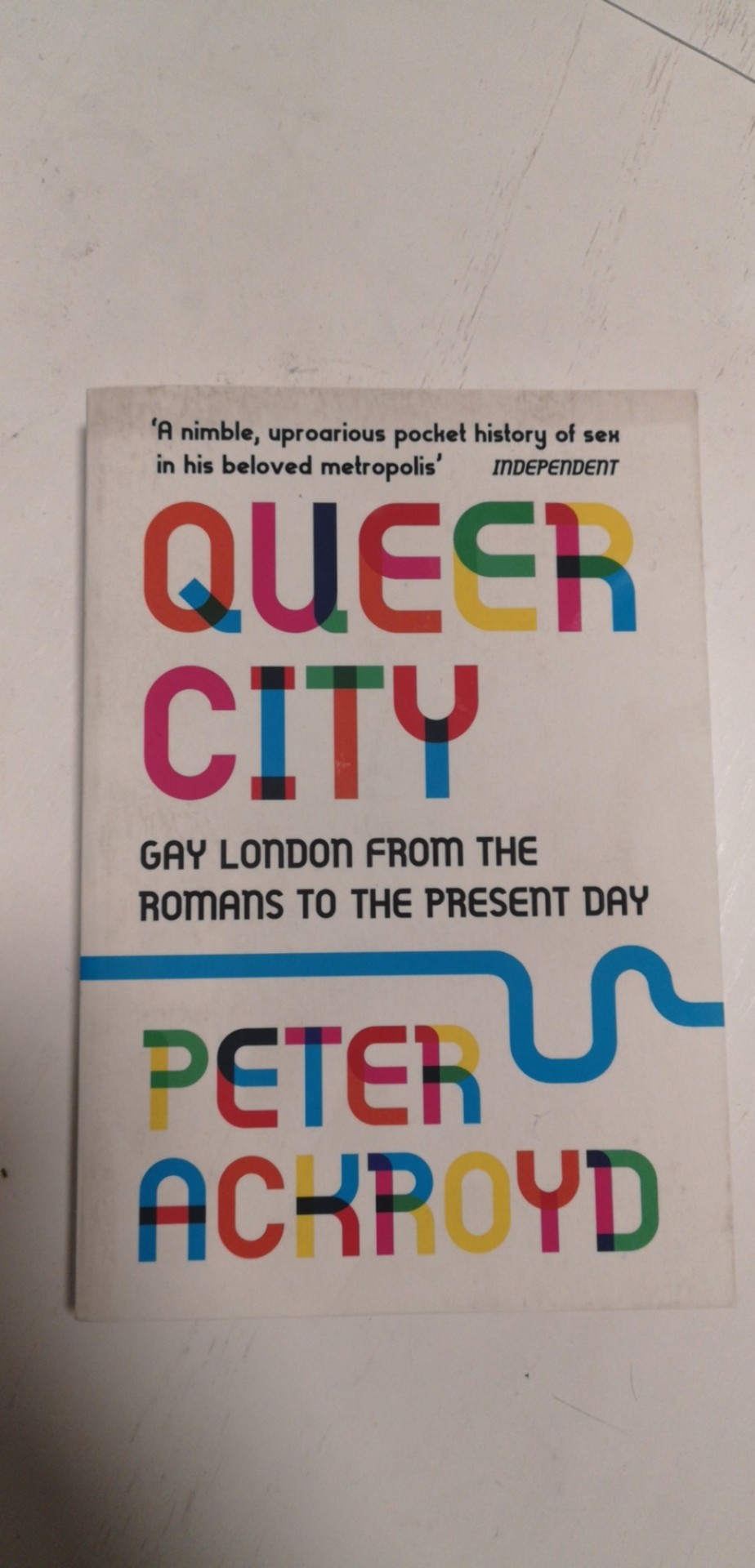#Peter Ackroyd
Explore tagged Tumblr posts
Text
“For Daniel Defoe, London was a great body which “circulates all, exports all, and at last pays for all.” That is why it has commonly been portrayed in monstrous form, a swollen and dropsical giant which kills more than it breeds. Its head is too large, out of proportion to the other members; its face and hands have also grown monstrous, irregular and “out of all Shape.” It is a “spleen” or a great “wen.” A body wracked with fever, and choked by ashes, it proceeds from plague to fire.” --Peter Ackroyd (London: The Biography)
12 notes
·
View notes
Text

Happy 75th, Peter Ackroyd.
1990 photo by Sophie Bassouls.
12 notes
·
View notes
Text

Queer City: Gay London from the Romans to the Present Day
Peter Ackroyd (Author)
Description
‘Droll, provocative and crammed to busting with startling facts’ Simon Callow, Guardian In this powerful Sunday Times bestseller Peter Ackroyd looks at London in a whole new way – through the history and experiences of its gay population. In Roman Londinium the city was dotted with lupanaria (‘wolf dens’ or public pleasure houses), fornices (brothels) and thermiae (hot baths). Then came the Emperor Constantine, with his bishops, monks and missionaries. And so began an endless loop of alternating permissiveness and censure. Ackroyd takes us right into the hidden history of the city; from the notorious Normans to the frenzy of executions for sodomy in the early nineteenth century. He journeys through the coffee bars of sixties Soho to Gay Liberation, disco music and the horror of AIDS. Today, we live in an era of openness and tolerance and Queer London has become part of the new norm. Ackroyd tells us the hidden story of how it got there, celebrating its diversity, thrills and energy on the one hand; but reminding us of its very real terrors, dangers and risks on the other.
Publisher Vintage Publishing
Publish Date 24 May 2018
Language English
Type Paperback
14 notes
·
View notes
Text
Birth of William Blake, 28th November 1757
In the visionary imagination of William Blake there is no birth and no death, no beginning and no end, only the perpetual pilgrimage within time towards eternity. But we cannot follow him into that bright world, not yet, and his story must begin above a hosier's shop in Soho where, at 7.45 on a November evening in 1757, he came crying into the rushlight and candlelight of a London winter. We may be able to see, if we look hard enough, the doctor's lantern and the fire of sea-coal that greet the piping infant; but the outlines of those who attended the birth remain shrouded in the deepest obscurity. Blake was later to invoke the 'Angel at my birth' and 'The Angel that presided oer my birth', but he remained strangely silent about his own more immediate family. The little that is known about them can be related here, as the infant is bound tightly in swaddling clothes before being returned to his mother.
- Peter Ackroyd, Blake, 1995

Infant Joy by William Blake, 1789
#english imagination#english culture#albion#england#art#english art#english writer#william blake#happy birthday William Blake#peter ackroyd#quote#birth of William Blake#infant joy#poem#18th century
4 notes
·
View notes
Text

Arthur Conan Doyle: The Sign of Four (1890)
#arthur conan doyle#sherlock holmes#penguin classics#detective#peter ackroyd#agra fort#the andamane#london
7 notes
·
View notes
Text

Queer City - Peter Ackroyd
Read: May - Jun 2023
This was a fun read. I love books about a specific place's queer history. Ackroyd makes it very clear that queer have always always been a part of London. I found this to be a comforting fact to be convinced of. As a queer person, I know we're here and always have been, it's just nice to be backed up so nicely by an academic.
London has such a long history that I was kind of surprised at how small the book was. I expected a less thorough accounting than I was given. So that was excellent. But as the timeframe is so huge, there was definitely a loss of definition in some parts that others did have. It felt as well that Ackroyd has a specialty in queer history covering the 16th to 18th centuries, or at least is more comfortable speaking to that timeframe. Still it was all very fascinating. I especially liked the coming evolution of the flamboyant and/or feminine gay. It was startling to me how far back that particular stereotype reached.
My favourite fact: a male brothel used to exist where Buckingham Palace is today.
Info: Vintage; 2017
#queer city#peter ackroyd#non fiction#lgbt history#history#gay history#queer history#london#gay london
9 notes
·
View notes
Text
"Dokunduklarımda yara izleri kaldı , öptüklerim dağlandılar."
6 notes
·
View notes
Text

Peter Ackroyd, Hawksmoor (1985)
1 note
·
View note
Text
“The image of London as a human body is striking and singular; we may trace it from pictorial emblems of the City of God, the mystical body in which Jesus Christ represents its head and the citizens its other members. London has also been envisaged in the form of a young man with his arms outstretched in a gesture of liberation; the figure is taken from a Roman bronze but it embodies the energy and exultation of a city continually expanding in great waves of progress and confidence. Here might be found the “heart of London beating warm.” The byways of the city resemble thin veins and its parks are like lungs. In the mist and rain of an urban autumn, the shining stones and cobbles of the older thoroughfares look like they’re bleeding.” --Peter Ackroyd (London: The Biography)
10 notes
·
View notes
Text

it no longer looks like an excess of human beings, but like a geological formation... it was piled up from soot and dust
"But other visitors saw other realities. The Czechoslovakian play- wright Karel Čapek, observing the East End at first hand in the early twentieth century, suggested that in 'this overwhelming quantity it no longer looks like an excess of human beings, but like a geological formation... it was piled up from soot and dust'. It is an impersonal force of dullness, the total aggregate of labour and suffering among the soot of ships and factories."
Peter Ackroyd, London The Biography.
0 notes
Text
30 Days of Literary Pride 2024 - June 17

The Last Testament of Oscar Wilde - Peter Ackroyd
1 note
·
View note
Text
Favourite Books of 2023
Top Ten Tuesday was created by The Broke and the Bookish and is now hosted by That Artsy Reader Girl. It was born of a love of lists, a love of books, and a desire to bring bookish friends together. Each week a new theme is suggested for bloggers to participate in. Create your own Top Ten list that fits that topic – putting your unique spin on it if you want. Everyone is welcome to join but…

View On WordPress
#alix e harrow#andrea penrose#jeremy clarkson#matthew reilly#meik wiking#nancy warren#peter ackroyd#raynor winn#stel pavlou#v.e. schwab
0 notes
Text
England is a land of dreams… for several centuries the English were characterised as “seers of visions”
- Peter Ackroyd

Glory be to God, 1860s by Georgiana Houghton
#english imagination#english culture#art#albion#english art#england#victorian#spiritualism#medium#Georgiana Houghton#women’s art#art by women#visions#quote#peter ackroyd#dreamscapes of albion
0 notes
Text

BOOKS: just picked up a couple of books in town this afternoon...good reading to come.
1 note
·
View note
Text

Peter Ackroyd: Hawksmoor (1985)
#peter ackroyd#hawksmoor#nicholas hawksmoor#architecture#psychogeography#postmodern#penguin books#mysticism#enlightenment
1 note
·
View note
Text
Every Con O’Neill character ticks at least three
•alcohol problem •manhandled by scary strong man (oh no😏) •shirtless scene •dad shaped (wholesome) •daddy shaped (sexual) •trauma •useless little worm •a homosexual •cool leather jacket •seductively smoking
…and then there’s Jim

#con o'neill#con oneill#con o’neill#izzy hands#cliff costello#Michael Scarborough Ahoy!#Peter Dancin thru the dark#happy valley#Neil Ackroyd#bedrooms and hallways#Terry#pie in the sky#Ian Lefebvre#Telstar#Joe Meek#uncle bbc#val pearson#and so on#like it’s literally all of them!#ofmd#ofmd izzy#midsomer murders#jim caxton
390 notes
·
View notes